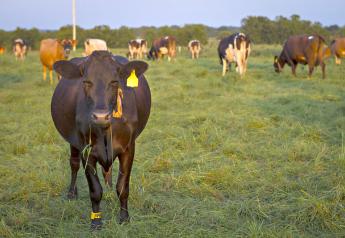Background and Research Supporting Caffeine for High-Risk Calves

Zach Janssen is Bovine Technical Services Veterinarian with TechMix, LLC.
By now you have probably heard about the idea of using caffeine to stimulate at-risk calves that are the result of dystocia (difficult birth), hypothermia from being born in the cold, or being run down from a stressful event such as disease or transport. While this seems to make sense because many of us rely on the benefits of caffeine (coffee, tea, soda) to get going every day, you may be asking, “Where did this idea come from and what is the science behind it?”
More than 40 years ago it was discovered that caffeine could be used to minimize the negative effects and risk of death due to apnea of prematurity (AOP) in human infants. Apnea is defined by cessation of breathing for more than 20 seconds, bradycardia (reduced heart rate), and cyanosis (turning blue). The positive benefits of caffeine in infants with AOP include reducing frequency of apnea, the need for positive pressure or mechanical ventilation and earlier, more successful extubation (removal of a breathing tube). All of this ultimately results in reduced rates of bronchopulmonary dysplasia (BPD) which is the failure of alveoli of the lungs, the tiny air sacs that are responsible for oxygen and carbon dioxide exchange, to develop.
Healthy lungs are obviously critical in the neonate as it switches from maternal oxygenated blood supply to breathing on its own, and certainly, can be important in calves that experience high rates of pneumonia. Current research on caffeine administration in infants experiencing AOP has demonstrated immediate treatment is more beneficial than later as defined by >48 hours after birth. Another long-term study showed that infants receiving caffeine had fewer cases of cerebral palsy and cognitive delay at 18-21 months of age and improvement of gross motor skills at ages 5 and 11 years compared to controls that received no caffeine treatment. This suggests that caffeine may have an overall neuroprotective effect.
One question I often get is: “How much should I give to my calf?” In neonatal therapy it is standard to administer a loading dose. This is a higher initial or first dose that is often used in medicines that are cleared from the body slowly because they have a long half-life. Then a maintenance dose is given which can be 25-50% of the original dose for weeks to months. Research has been done on increasing both doses in premature infants. While no harmful effects were seen, no additional benefits were observed either.
Extrapolating the common loading dose of caffeine used in the NICU to a 70-pound calf would be near the recommended maximum daily consumption for an adult human. Keep in mind that the lethal dose of caffeine in humans is about 20 times the recommended daily dose. Although, additional studies may be necessary to determine the optimal dose, considering other possible treatment options, caffeine administration is actually quite safe in the neonate. Commercial formulations specific to calves have taken this into account and provide the appropriate levels compared to a “gas station supplement.”
Caffeine citrate administration in human infants has proven safe and effective. Therefore, it is one of the top five treatments given to newborns. Here are the established benefits that we see in human infants that would also be expected to be seen in high-risk calves given caffeine.
Brain
- Increased respiratory neural output by blocking the effects of adenosine – a neurotransmitter that causes generalized depression
- Neuroprotective anti-inflammatory effects
- Healthy formation of nerve fibers
- Reduces cell death
Lungs
- Improves diaphragmatic contractility
- Reduces pulmonary inflammation
- Induces surfactant production to protect airways
- Diuretic effect can remove excess fluid and facilitate breathing
Heart
- Increased pumping ability by contraction and volume
- Increased blood pressure
The above changes are quickly seen, as another benefit to caffeine administration is that it takes effect rapidly (typically less than 30 minutes). While caffeine citrate has proven so effective in humans, we are not able to feed this synthetically produced compound to animals due to AAFCO (The Association of American Feed Control Officials) regulations. I often heard of veterinarians telling a farmer to brew up a pot of coffee to warm and stimulate a calf after a hard pull in cold winter conditions. This would work; however, it may take that whole pot of coffee to be effective and consider the room it would occupy in the calf’s stomach that also needs four quarts of colostrum ASAP! Concentrated green tea extract meets the requirements of being all-natural, effective and is a Generally Regarded As Safe (GRAS) feed ingredient by AAFCO.
Calves that are born early as the result of being twins, have low birth weights, experience dystocia or are born in the cold will be at high risk. These calves are often depressed, hypoxic (low oxygen) and facing inflammation. Successful use of caffeine in infants experiencing apnea of prematurity has demonstrated benefits to lung development, neural development and has saved lives. It is logical to extrapolate these same benefits when caffeine therapy is used early in high-risk calves. Considering the value that calves represent to the future of the farm it would be advised to have a convenient, properly formulated source of caffeine readily available to support these high-risk calves.







